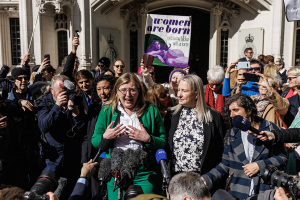Torture is Torture - It's Illegal and Wrong
Twenty-five years ago, President Ronald Reagan vigorously championed U.S. ratification of the international Convention Against Torture, which he signed on April 18, 1988. Reagan acclaimed it as having marked a significant step in the development of international measures against torture and other inhuman treatment.
"Ratification of the Convention by the United States," Reagan wrote, "will clearly express United States opposition to torture, an abhorrent practice unfortunately prevalent in the world today." Little could he have known that the United States would itself soon engage in this "abhorrent practice."
That our government authorized and permitted the torture of a number of suspected terrorists and other detainees in its custody is one of the key conclusions reached in a comprehensive report released earlier this month by The Constitution Project's Task Force on Detainee Treatment, an independent bipartisan group charged with examining the treatment of people captured in response to the global terrorist threat during the last three administrations.
Without a doubt, the terrorist attacks of September 11 were among the most heinous acts ever visited upon this nation, a clear violation of the laws of war and any kind of civilized moral code. Nevertheless, the torture of suspected terrorists, no matter how monstrous their alleged crimes or connections, is expressly proscribed by American and international law. The legal prohibition against torture is rooted in our Bill of Rights; the explicit rejection of torture, even in the middle of national emergencies, dates back at least to Abraham Lincoln and the American Civil War.
Torture is not a concept whose definition exists in the eye of the beholder. The U.S. government has historically condemned many of the same interrogation practices used by U.S. personnel against terror suspects in the wake of 9/11. Waterboarding, stress positions, extended sleep deprivation, nudity and prolonged solitary confinement have all been deplored by the U.S. State Department when practiced by other countries, by U.S. civilian courts in cases other than those dealing with terrorism, and by respected global humanitarian organizations such as the International Committee for the Red Cross. If these techniques are torture when others in engage in them, how can they be anything less when we use them ourselves?
We are troubled that so many high-ranking former political and military leaders continue to suggest that there is a legal or moral justification for torture. They argue that lawyers in the Office of Legal Counsel approved the use of certain interrogation techniques because they defined them as not being torture. Those opinions, since repudiated by legal experts and the OLC itself, relied not only on a very narrow legal definition of torture but also on factual representations about how the techniques would be implemented that later proved inaccurate.
Those who sincerely believe that the ends justify the means when it comes to coercive interrogations are free to try to change national and international laws. But they are not free to ignore those laws.
Much of the torture that occurred in Iraq and Afghanistan was never explicitly authorized. However, once the Bush administration declared that the Geneva Conventions, a venerable instrument for ensuring humane treatment of prisoners in time of war, did not apply to captives in Afghanistan or Guantanamo, many lower-level troops said they believed that "the gloves were off" regarding treatment of prisoners.
Loosening restrictions on physical and mental cruelty dehumanizes not just detainees but also their captors. In the heat of military conflict, amidst a climate of fear and loathing of the enemy, what may be intended as carefully calibrated interrogation techniques to be used on a few "high-value" detainees can quickly devolve into the infliction of pain for the sheer fun of it. The attitude among the higher-ups that allowed the setting aside of traditional legal rules that protected captives in a few instances quickly dropped down the chain of command, and led directly to the abuses at Abu Ghraib and elsewhere.
Regardless of political party, the leaders of this country should acknowledge that the authorization and practice of torture and cruelty after September 11 was a grave error and take the steps necessary to ensure that it cannot be repeated. As a nation, we must recognize that our government is not exempt from the rule of law. Only then can we reclaim a role of moral leadership in the world.





























